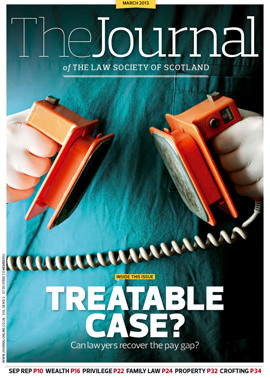ABS in waiting

Our search for new practice models is straying a little this month. Seeking non-traditional models that still come under the regulation of the Law Society of Scotland, we came across a business that largely, though not entirely, falls outside its scope. Yet come ABS, it plans to apply for licensed practice status, perhaps indicating the desirability of introducing the new regime.
The name is Vialex Ltd, set up three years ago by former Dickson Minto partner Keith Anderson and his solicitor colleague Keith Dinsmore. With the equity held by the two Keiths and another Scottish solicitor, all holding practising certificates, there is no reason at present for it not to become a fully regulated legal firm – except that Anderson wants to be able to introduce external capital in a more traditional commercial or corporate way, and to incentivise any non-lawyer advisers.
“Vialex is not a law firm, but all our legal advisers as we call them, in order to ensure there is no confusion that we are a law firm, hold practising certificates from the Law Society of Scotland or in some cases the Law Society of England & Wales,” Anderson explains. (The separate company through which it provides employment advice has a shareholder with a human resources background.)
“So the underlying reasons why we set it up in that way have not as it turned out been compelling, but I emphasise that we place great importance on the badge of being a solicitor and the expectation that that quite rightly provokes in the minds of the public. This has not been driven by us wanting to employ a lot of unqualified people. What we have been focused on is quality of product, and the reason for our structuring ourselves as we have is the commercial advantages which will be available once ABS has been introduced.”
In-house, on tap
Its service model – which a true law firm could copy if it chose – is to replicate a corporate in-house function for businesses that do not have, or need to supplement, their own in-house team, in five core areas: corporate, general commercial contract, IP, banking/finance, and employment. Working from clients’ offices if appropriate, advisers are a mix of full time, part time and consultant, providing flexibility depending on workload.
A principal feature is its subscription-based billing arrangements, offering, says Anderson, “the attraction of being able to buy these services at a predictable cost from an external provider that would sit halfway between the client and traditional lawyers. We have devised a service model where the client is invited to purchase all or any of those five streams, and we agree with the client that it will have unlimited use of the service for a pre-agreed monthly subscription.
“It’s not a retainer, because with a retainer at the end of each quarter there would be a reckoning up or down and a balancing invoice issued. It’s a subscription that is fixed; we don’t reprice retrospectively, but instead at quarterly or half-yearly intervals, as the client is established, we review the client’s usage with them and flex the subscription up or down. The intention is to ensure that say over a six or 12-month period, the client is left with the feeling that they have received good value for what they have paid for and we feel that we have made a decent return.”
Anderson agrees with those who preach the merits of value billing as opposed to hourly chargeout rate (see, for example Journal, October 2011, 12), believing that the latter does not truly reflect the value of the work to the client. It can work against the lawyer if a relatively short time spent proves very valuable to the client, but against the client if the fee ends up exceeding what the client gains. “So it’s about certainty and cost and breaking down any barrier the client might feel about picking up the phone. Some people think that with our model, the clients will never be off the phone, but the reality is they have better things to do with their time.”
Operating as Vialex does, brings certain limitations at present. It has to arrange its own professional indemnity cover, being unable to join in the Master Policy. It does not undertake any of the reserved practice areas – though owns a separate, regulated, legal firm, Vialex WS, of which Anderson is principal, whose sole client is Vialex Ltd, to handle anything that needs to be done through a law firm. It also has to make it clear to clients that “if there is any issue in relation to which we consider it important that they have professional privilege, the matter will be handled by Vialex WS. That’s where I have my practising certificate, and I contribute to the Guarantee Fund,” Anderson explains.
“We are set up in a way that suits us commercially, but not in a way that is intended to avoid the cost of regulation or whatever. In fact, I look forward to the ABS regime coming in because I think there is no reason at all for us not to be an ABS.”
In this issue
- Remember, remember?
- Equal justice for all?
- Compatibility: devolution issues reborn
- Profiting from the past
- RTI for PAYE - are you ready?
- Reading for pleasure
- A modest proposal – civil marriage ceremonies for all
- Opinion column: Alistair Dean
- Book reviews
- Profile
- President's column
- Fee review: as you were
- Time to draw a line?
- The pay gap: seeking a cure
- Wealth management: Personal injury trusts - how to best invest
- Wealth management: Discretion - the model of choice
- Wealth management: Inheritance tax - discounts up front
- Wealth management: Pensions - time to look ahead
- Whose privilege is it, anyway?
- FLAGS unfurled
- Percentage game
- Rent, rent and rent again
- Sport, rights, and the internet
- An innocent mistake?
- Scottish Solicitors' Discipline Tribunal
- The trouble with in-house lawyers
- Lease of life for the High Street?
- PSG update
- Vacant and ready
- ABS in waiting
- Better ways: where to start?
- Keeping errors in check
- Ask Ash
- How not to win business: a guide for professionals
- What does a speculative fee allow?
- Law reform roundup






